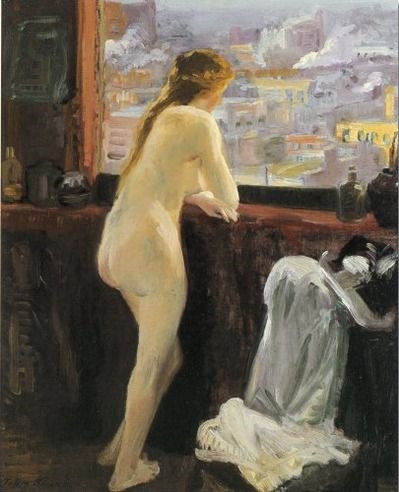Editor's Page
To Hunt a Nazi by Roberto Fox (as told to Frank Thomas Smith)
There are moments in the present, but also in the past and I hope in the future, when I have the urge to pull Eliot out from my book case and read Four Quartets. The moments are usually when I�m bogged down with a story or a poem and think that a solution simply isn�t possible. Somehow Quartets � only that, not other poems by Eliot or any other poet � inspires me, or at least gives me hope that anything is possible. I was meditating on these three lines when the phone rang. I was sitting at my desk with my back to my picture-window overlooking the Buenos Aires municipal golf course in Palermo Park. I can�t face the park while working because its beauty distracts me. Anyway it was foggy, a common occurrence on autumn mornings, though the sun usually burns the fog away by mid-morning. I picked up the phone and swiveled around towards the park: �Hola�
�Mr. Roberto Fox, please?� a woman�s voice asked in English.
Continue reading
Current Events
Slouching Toward Mar-A-Lago by Andrew J. Bacevich
Like it or not, the president of the United States
embodies America itself. The individual inhabiting the White House
has become the preeminent symbol of who we are and what we represent
as a nation and a people. In a fundamental sense, he is us.
It was not always so. Millard Fillmore, the 13th
president (1850-1853), presided over but did not personify the
American republic. He was merely the federal chief executive.
Contemporary observers did not refer to his term in office as the Age
of Fillmore. With occasional exceptions, Abraham Lincoln in
particular, much the same could be said of Fillmore’s
successors. They brought to office low expectations, which they
rarely exceeded. So when Chester A. Arthur (1881-1885) or
William Howard Taft (1909-1913) left the White House, there was no
rush to immortalize them by erecting gaudy shrines -- now known as
“presidential libraries” -- to the glory of their
presidencies. In those distant days, ex-presidents went back
home or somewhere else where they could find work...
Continue reading
Features
The Pig on Your Plate by Barbara J King
That pigs are smart
and sensitive is not in doubt. How can we justify continuing to kill
them for food?
Domestic
pigs, the kind portrayed in hot-pink neon above barbecue joints,
curly tailed and carefree, have prodigious memories. In
problem-solving with computers, they match wits with little kids and
win. They are able to plan ahead, and they live in complex social
communities. They recognise other pigs as distinct individuals. Pigs
aren’t just cerebral, though: they have heart. When others are
in distress, they can express concern and act with empathy. A
description of pig behaviours, derived from scientific experiments
and compiled
by Lori Marino of the Kimmela Center for Animal Advocacy and
Christina M Colvin at Georgia Institute of Technology is so
impressive, you might think it was about chimpanzees, elephants or
whales...
Continue reading.
On Dubbing Movies by Jorge Luis Borges
Art�s possibilities for
combination are not infinite, but they tend to be appalling. The Greeks begot
the chimera, monster with the head of a lion, with the head of a dragon, with
the head of a goat; the theologians of the second century the Trinity, in
which the Father, the Son and the Spirit are inextricably joined; the Chinese
zoologists the ti-yiang, supernatural auburn bird with six feet and four
wings, but no face or eyes; the geometricians of the twentieth century the
hypercube, a four dimensional figure that encloses an infinite number of cubes
and is bordered by eight cubes and twenty-four squares. Hollywood has now
enriched this inane teratological museum. By means of a malign artifice called dubbing,
they propose monsters which combine the illustrious features of Greta Garbo
with the voice of Aldonza Lorenzo. Why not publish our admiration for this
distressing wonder, for these industrious phonetic-visual anomalies?
Continue reading - Espa�ol
Fiction
The
Garden of Forking Paths by Jorge Luis Borges
On
page 224 of Liddell Hart's History of World War I you will read that
an attack against the Serre-Montauban line by thirteen British
divisions (supported by 1,400 artillery pieces), planned for the 24th
of July, 1916, had to be postponed until the morning of the 29th. The
torrential rains, Captain Liddell Hart comments, caused this delay,
an insignificant one, to be sure. The following statement,
dictated, reread and signed by Dr. Yu Tsun, former professor of
English at the Hochschule at Tsingtao, throws an unsuspected light
over the whole affair. The first two pages of the document are
missing.". . . and I hung up the receiver. Immediately
afterwards, I recognized the voice that had answered in German. It
was that of Captain Richard Madden. Madden's presence in Viktor
Runeberg's apartment meant the end of our anxieties and-but this
seemed, or should have seemed, very secondary to me-also the end of
our lives. It meant that Runeberg had been arrested or murdered...
Continue reading
Passing Away in Boca Raton by Roberto Fox [as told to Frank Thomas Smith]
My mother left an
ambiguous message on my answering machine: Robby baby, don't you think it's
time to visit? I need to talk to you about passing away. She lives in a gated community in Boca
Raton, Florida. I
visit her twice or thrice a year in a devoted son routine, but until now I've
always combined the trip from Buenos
Aires with other business in the States. At the moment
I had no other business there, but you can imagine why after receiving a
message like that and trying unsuccessfully to get her all day on the phone, I'd
take the first plane north. My mother is in her late eighties and except for some
mild memory problems has always been healthy, but at that age anything can
happen, and fast...
Continue reading
Miryam - Part Four by Luise Rinser
It was good that in
those days something new was introduced, something unexpected: two
women came, Yochana, the wife of Chuza, Herod's finance
minister, and a court-lady by the name of Shoshana. My
jaw dropped. I'd known them for a long time. Yochana had been
one of my father's best customers, she came often to Magdala
representing Herod. She came with great pomp and ordered the best
oils and aromatic waters and ointments, She was rich herself and well
married, it seemed, and had three children. Now she came on foot, she
and her serving lady, and they were dusty and without make-up.
What
do you want here?
To
live with you.
Do
you spoiled women have any idea of how we live?
We
do have an idea, and that's why we're here, Yochana said. What's
happened to you? What changed you so much? Is this a joke or are you
in earnest?
I
am very much in earnest. I have burnt all bridges behind me...
Continue reading
Children's Corner
How the Donkey Got its Cross by Frank Thomas Smith
Donkeys are
stubborn, all of them, but some are more stubborn than others. Mine is the most
stubborn one I know. If you want him to walk, he stands still. If you want him
to stand still, he walks. If you want him to work, he sleeps or pretends to
sleep. If you want him to sleep...but no, who would want him to sleep? But if
you did want him to, he would surely stay awake all night. Nevertheless, I
love my donkey very much because he's a good friend, doesn't lie and doesn't
hurt anyone. And he's always willing to take me on his back to the teacher's
house and he waits all morning until I leave and takes me home. Some of the
kids have ponies, but none of them rides a donkey because, as I said, they are
very stubborn. My donkey doesn't
let anyone but me on his back and if you forced him to do so, he wouldn't move
a step forward. You could push him, beat him, beg him; he wouldn't move. He
won't let anyone else lead him either...
Continue reading - Espa�ol
Anthroposophy
Conspiracies - the Play by (Identity classified)
This one-act-play was performed in August 2017 in the Facebook theater. It was leaked by an unknown patriot, despite being classified Top Secret and verboten by the Anthroposophical Society's counter-conspiracy division. (Shred before reading.)
The Players (in order of appearance): Tarjei Straume, Frank Thomas Smith, Sarah Cherry, James D. Stewart, Rosann Roxy Jentes, Bradford Riley
Tarjei (quoting Rudolf Steiner): "Yes, indeed, the Americans should not pride themselves on their forebears,
their European blood ancestry. Rather they should point to the fact that
they once lived in Asia at the time of the Mystery of Golgotha, and
there went through a culture which was not yet permeated by
Christianity; thus they are also those who accept Christianity through
external tradition and external education. There is still a strong
opposition from this quarter to a soul-spiritual conception of the
world."
Continue reading
The Spiritual Matrix - An Anthroposophical Reading, or, this essay is the red pill by Seth Miller
Abstract:
This
essay explores the Matrix trilogy of movies from the perspective of
spiritual science. Close attention is paid to the actual events in
the "text" of the movies, with an eye towards illuminating
features concerning the major characters and plot elements in a
coherent, symbolic, and mythological perspective. In particular the
movies are shown to be uniquely understandable from the perspective
of Rudolf Steiner's anthroposophical insights concerning human
evolution...
Continue reading
Bio-dynamic Agriculture Course - Lectures 1 & 2 by Rudolf Steiner
I
am quite convinced that everyone here will be perfectly satisfied
with the hospitality that has been provided. Whether you will be
equally satisfied with the course of lectures itself is a question
which is perhaps open to dispute, although we shall do our best
during the discussions which will take place later, to reach accord
on what has been said. For you must remember that though in many
quarters there has been an ardent desire for such a course of
lectures, it is the first time that I have undertaken such a task
from within the heart of Anthroposophical striving.
Continue reading
The Gospel of John - Lecture 2 - Esoteric Christianity by Rudolf Steiner
The
first words of the Gospel of St. John touch upon the deepest
mysteries of the world. This can be seen when we allow the truths
of Spiritual Science which lie at their very foundation to pass
before our souls. And we must dip deeply into spiritual knowledge
if these first words of this Gospel are to appear to us in the
right light. We must recall to memory much that is well known to
those of you who for a long time have been occupying yourselves
with the anthroposophical worldview. But today we shall
need to expand certain elementary truths of this worldview by
penetrating further into various significant cosmic mysteries...
Continue reading
Spiritual-scientific Cosmology - Lecture 1 - by Rudolf Steiner
The lecture cycle on the basic elements of
Theosophy that I recently announced will have to be given later at a more
appropriate time. I have postponed those lectures and decided for now to
dedicate Thursdays to the subject of cosmology, the evolution of the world, that
is, the teaching about the inception of the world and the shaping of the human
being within this world in a theosophical sense. I am aware that this
involves the most difficult chapter of theosophical teaching, and I can inform
you that several of our branches have decided not to even touch upon this
chapter because it is too difficult. Nevertheless, I have decided to do so,
because I believe that the indications I am able to give may be useful to many
of you. Even though we cannot cover the subject completely at once, we can
nevertheless receive indications that will serve to allow us to penetrate more
deeply into the material later...
Continue reading
"Apologia" concerning the publication of the the First Class Lessons: English /
Espa�ol
Poetry
The Last Letter by Romano Giudicissi
He who has
ears let him hear:
For Alma, so loved
As no one has ever loved her,
So loved as no one
Will ever love her again:
Alma
after all
that has been
between us,
after all
we have already said,
not even I know
why I am writing to you,
but I cannot omit doing so,
and I am
sending you this
as the last of my letters...
Continue
The Promised Land & She Doesn't Like Me by Kimberly Potter Kendrick
On
the edge of the cliff I cowered
Jagged rocks, narrow path
Green fields of lilac and sunflowers
The strength of the mighty river below
One more step, could I fly?
A bird, yes, not I
It’s not what I desired
Turning back I cannot fully remember the whole journey
The poppy fields began my trek
The precarious trail drew me...
Continue reading
Words and Music
Manhattan Tower by Gordon Jenkins
Listen all you New Yorkers, there's a
rumor going round
That some of you good people want to leave
this town
Well, you better consult with me before you go
Cause I been to all those places and I know
Chicago?
Well, Chicago's all right, it's got
Marshall Field and Soldier's Field
and it's on a nice lake
But
it hasn't got the hansoms in the park
It hasn't got a skyline
after dark
(That's why New York's his home)
Let me never
leave it
New York's my home, sweet home...
Continue reading and listening.
You can find us under the
Southern Cross in the Traslasierra Valley, Province of C�rdoba, Argentina. Visitors always welcome. Just follow the sign that reads: La Cruz del Sur.
Frank Thomas Smith, Editor
Contact
Authors'
Guidelines
so we can advise you when the next issue is ready. Many people are switching to Gmail. If you do, please advise us so we can change your subscription address.
For back issues, use the issue number.
For example: http://southerncrossreview.org/79/index79.html will deliver SCR number 79. For authors or titles, enter names or keywords in the Google search box below.
|


















